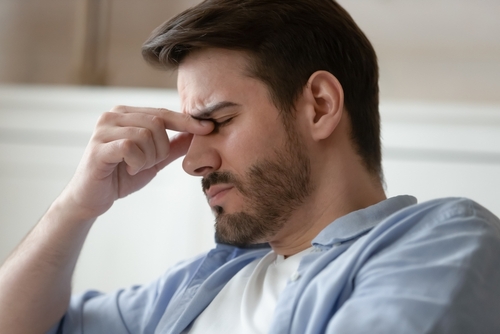
In the realm of optometry, dry eye is a prevalent ailment that affects millions of individuals worldwide. This condition, characterized by a chronic lack of sufficient lubrication and moisture on the surface of the eye, can lead to discomfort and visual disturbances such as blurry vision. Understanding their link and knowing the appropriate steps to take can significantly help in managing these conditions.
Understanding the Link Between Dry Eye and Blurry Vision
Dry eye and blurry vision are closely intertwined. A thin layer of tear film that covers the surface of our eyes serves several important purposes. It helps to lubricate the eyes, protect them from environmental irritants, and maintain clarity of vision. When the quality or quantity of this tear film is compromised due to dry eye, it can result in blurry vision.
The tear film is made up of three layers: an outer oily layer, a middle watery layer, and an inner mucous layer. Each layer plays a crucial role in maintaining eye health and clear vision. In people with dry eyes, either the tear film evaporates too quickly or the eyes don't produce enough tears. This can lead to irregularities on the surface of the eye, causing light entering the eye to scatter instead of focusing properly on the retina, resulting in blurry vision.
Dry eye can also cause damage to the cornea, which is the clear, dome-shaped surface that covers the front of the eye. Any damage to the cornea can cause blurry vision. Therefore, treating dry eyes is crucial not just for comfort but also for maintaining good vision.
Causes of Dry Eye
There are several causes of dry eye that can lead to blurry vision. Aging is a significant factor, as our eyes naturally produce fewer tears as we get older. Certain medical conditions, like rheumatoid arthritis, diabetes, and thyroid problems, can also cause dry eyes. Additionally, lifestyle factors such as prolonged screen use, wearing contact lenses, and living in a dry climate can contribute to the development of dry eye.
Certain medications, such as antihistamines, decongestants, hormone replacement therapy, and antidepressants, can also cause dry eyes as a side effect. Lastly, some people may have dry eyes due to issues with their eyelids or tear ducts or a lack of certain nutrients in their diet.
Identifying the underlying cause of dry eye is crucial to determining the most effective treatment approach.
The Importance of Regular Eye Exams
Regular eye exams play a crucial role in maintaining eye health and preventing vision problems. They are especially important for individuals suffering from dry eyes and blurry vision. During an eye exam, an optometrist can thoroughly examine your eyes and detect any signs of dry eye or other vision problems.
An eye exam can also help identify the underlying causes of dry eye. For instance, your optometrist may ask you about your lifestyle, medical history, and medication use to identify potential risk factors. They may also use specialized tests to measure your tear production and evaluate the quality of your tear film.
Regular eye exams can also help monitor the progress of your dry eye condition and the effectiveness of your treatment. They can enable your optometrist to make necessary adjustments to your treatment plan, ensuring that you receive the most effective care for your dry eye and blurry vision.
Consulting an Optometrist for Dry Eye and Blurry Vision
Consulting with an optometrist is a crucial step in managing and treating dry eye and blurry vision. An optometrist is a healthcare professional who specializes in eye care and vision health. They are trained to diagnose and treat a wide range of eye conditions, including dry eye.
During your consultation, your optometrist will conduct a comprehensive eye exam to assess your eye health and vision. They may use a variety of tests to diagnose dry eye, such as the tear breakup time (TBUT) test, Schirmer's test, and ocular surface staining. These tests can provide valuable information about the quantity and quality of your tears and the health of your eye surface.
Based on the results of these tests and your symptoms, your optometrist can recommend the most suitable treatment options for your dry eye and blurry vision. They can also provide advice on lifestyle changes and self-care measures to help manage your symptoms and improve your vision.
Treatment Options
Treatment for dry eye and blurry vision aims to restore the balance of the tear film, relieve symptoms, and improve vision. The choice of treatment often depends on the severity of dry eye and the underlying cause.
Artificial tears or lubricating eye drops are the most common treatments for dry eyes. They help to supplement your natural tears and keep your eyes moisturized. For more severe cases, prescription medications such as anti-inflammatory eye drops, corticosteroids, or tear-stimulating drugs may be used.
In some cases, minor surgical procedures may be recommended. These include punctal plugs to block the tear ducts and conserve tears, or thermal cautery to permanently close the tear ducts. Additionally, lifestyle changes such as reducing screen time, wearing sunglasses outdoors, and maintaining good eye hygiene can also help manage dry eyes and improve blurry vision.
Conclusion
While dry eye and blurry vision can be distressing, understanding their link and knowing the appropriate steps to take can significantly help in managing these conditions. With the right treatment and self-care measures, it is entirely possible to alleviate the symptoms of dry eye and restore clear vision.
To learn more about navigating blurry vision due to dry eyes, consult with our professionals at Memorial Vision in our Houston, Texas, office. Call (281) 496-1635 to schedule an appointment today.









